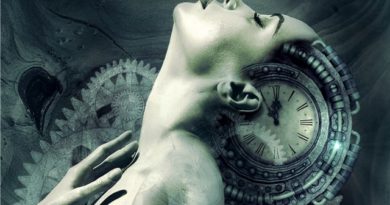For a Lack of Time
The doctor stumbled a bit as he stepped back to admit our guide, who didn’t walk past him so much as flow past him like a river of molten metal. Scala scrambled in after him, hitting his head lightly on the doorframe as he went.
While Dr. Freeman went over the checklist with Dr. Philageous, I settled into the pilot’s chair in front of the windshield. I heard a sound directly behind me and turned to see that Thoroughgood had settled into one of the four chairs that lined both sides of the cabin ― one of the ones closest to the front, to me. Up close, I saw that there were scratches along the butt of his rifle. I nodded at them. “What are they about?”
He glanced down, then hoisted the rifle up so I could see them clearly. “Things I’ve killed.” He gave me a grin. “Things that were worth mentioning, that is.”
I nodded, trying to look appreciative and keep from turning green, and turned back to my control console, rechecking the ignition system I’d already checked twice.
After another fifteen minutes, five of which were exhausted with Dr. Freeman and Dr. Philageous arguing over the bean content of our food stores, all of the food and other equipment had been loaded safely into the storage compartment at the rear of the ship, away from the cabin so that when it was pressurized, we wouldn’t lose air into the storage area. I swiveled my seat around to face the four men staring forward at me.
“This is it,” I said, hoping that my words had the sort of gravitas that goes with important, history-making events. God, I was just like Neil Armstrong, stepping onto the moon. Which turned out to be a god-forsaken wasteland. “When I flip the switch we’re sixty-five million years in the past. Anyone having second thoughts needs to disembark now.” I waited a moment, a dramatic pause worthy of an award. “Well, then. Let’s get under way.” And I turned and flipped the switch.
For the briefest of moments, there was nothing, and I was instantly and completely terrified that the whole thing wasn’t going to work, that the doctor’s hundreds of tests that had told him that it would work had been for nothing, and that I’d wasted all that drama on the machinations of a senile man who enjoyed blow-torching mushrooms under a desk. Then a low hum began in the console. In the next instant, I was aware of a vibration in the floor and in my metal chair and in the console. I checked the power output gauge, an actual needle, not a digital display. The doctor had a fondness for the old school. The time machine’s power was rising.
I glanced back at Dr. Philageous. He was all smiles. I gave him a thumbs up, and he returned the gesture. Out of the corner of my eye, I caught Thoroughgood doing that same disapproving thing before I turned back to the console.
The time machine cycled up, the vibration growing more intense. I started thumbing buttons and switches. Keeping the time machine “on course” was at once a lot like flying and nothing like flying. A lot in that it required constant attention to instrumentation balance. Nothing in that there was no physical movement, no thrust. As I worked, I glanced out the window and saw that a veritable kaleidoscope of colors was beginning to swirl and shine around the glass. From the gasp behind me ― Scala ― I figured they were beginning to see the light distortion. I could hear a scratching sound. Dr. Philageous was already taking notes.
When the vibration got to the point where I couldn’t adequately hold my hands on any of the controls without them being shaken off, and the light outside had fully enveloped the windshield and was blindingly strong, there was a last, violent shudder, and then we were through. I removed my hands from my eyes ― I wasn’t aware of placing them there to shield myself from the brightness in front of me ― and waited for them to adjust to the relative darkness, expecting to slowly begin to see trees and plains and rivers and gigantic creatures straight out of a museum.
For some two minutes, I stared at the windshield, waiting for my eyes to adjust, growing increasingly confused as they didn’t. Eventually, after staring for a good three minutes straight, I realized that my eyes had adjusted fine ― I could see the panels next to the windshield, as well as the control panel in front of me. But what was beyond the windshield was pure black.
Except it wasn’t. I leaned forward, straining against my restraints, angling forward to press my face against the glass. There were tiny little spots there. At first, I thought they were blemishes on the glass; then I thought they were holes in the glass, admitting light through whatever black covering had enveloped us. Then I realized what they were. Stars.
I turned back to look at the four men behind me. They were still staring forward, apprehensive. I no longer had any idea how history was going to remember my words. I spread my hands out in front of me, helpless. “We’re in space.”
⊕
There was a moment of dumbstruck silence, and then several things happened at once. Scala laughed, made a remark about how he’d thought that Dr. Philageous had built a time ship, not a space ship, and that he must have taken the wrong door. Dr. Freeman turned to Dr. Philageous, the full bore of his piercing gaze hitting the old man, whose smile had finally faltered. And Thoroughgood, his gaze just as severe, turned to look out the porthole directly behind him, his movement measured and precise, but all full of tension.
When he turned back, Scala stopped laughing, and all three of the other men ― and myself ― gave our guide our attention. He nodded. “We do, appear, to be in space.” He turned to Dr. Philageous. “Perhaps you’d be so kind as to explain this development, doctor.”
The doctor scratched his head and glanced out the porthole, too. “Not too sure, yet. There are a few possible explanations, but without supplementary data, I don’t know, good chap.”
Scala, who had gone entirely white, went to respond, but Thoroughgood silenced him with a raised hand. “Give it your best guess.” The tension in his body was apparent in his words, too. “I think you science types refer to that as a hypothesis.”
Dr. Philageous chortled, his smile returning. “Hardly the best circumstances, but I suppose there’s no time like the present, eh?” When no one laughed, he continued. “My best guess is that the machine’s temporal distortion isn’t gravimetrically-tied.”
Thoroughgood shut his eyes. “In English, my dear man.”
The doctor sighed and sat back in his black leather chair. “It’s like this. We always assumed that if we traveled back in time on Earth, we’d arrive on Earth. Well, the only reason we were “on Earth” in the first place is because of gravity ― it holds us down and keeps us from floating away, but it also keeps us from being flung off, since the Earth is constantly moving. Well, in traveling back in time, we arrived in the same “space” ― except at this point in history, the Earth isn’t here.”
Thoroughgood’s eyes were fast becoming a rival for Dr. Freeman’s in terms of the potential for cutting through the time machine’s walls ― a prospect which, once I’d thought of it, made me turn a little green. “So you’re telling me that we have to wait for the Earth to find its way around its orbit to us? Then what, it slams into us?”
Scala, white as a ghost, shook his head, flopping his hair into the bulkhead behind him. “Nope. Not so much.”
“What?” Thoroughgood said, trying to catch Scala’s eye. When the professor wouldn’t meet his eye or reply, Thoroughgood looked back at the doctor. “What’s he mean?”
Dr. Philageous was looking at Professor Scala appraisingly, shaking his head slowly. “Of course,” he muttered. After a second, he seemed to realize that he was surrounded by at least three men who were waiting for a response. “The thing people tend to forget is that it’s not just the Earth that’s in motion. It’s the sun and our whole galaxy. You can only say that something is standing still if you have a point of reference.
“Think of it this way. You and your friend get into automobiles and drive side by side, both at sixty miles per hour. If you only look at your friend’s car, it’ll look like it’s standing still, since you’re both traveling at the same speed; it’s only if you look beyond it at the trees on the side of the road that you realize you’re moving.
“So here we are, occupying the same “space” sixty-five million years ago that we were in the future. But during all that time, the Earth, the sun, and our galaxy have all been moving. We’ve lost our point of reference ― the Earth ― because once we entered the temporal distortion, gravity stopped mattering.
“It would probably be possible to calculate our position with the Maricham Institute’s supercomputer, factoring in the amount of time elapsed, the tested progress of the expansion of the universe, the relative present-day position of the Earth to the galactic core, and any measurable change in distance between our galaxy and the others we’ve been able to study, but the calculations would take ― well, let’s just say, quite a while. Suffice to say, in our present situation, we have no way to tell how far away the Earth is, but the chances that it will come swooping out of the sky at us are so small that they needn’t be discussed. We’re about as likely to have a meerkat spontaneously pop into existence in our midst and start waltzing around the cabin.”
Only Scala didn’t seem to be hanging on the doctor’s every word. Dr. Freeman, who’d regained some of his composure and only now looked mildly annoyed instead of enraged, was the first to respond. “So what do we do?”
The doctor glanced out the porthole again. “Nothing, especially,” he said, reclining. “Wait it out and head back as soon as we can. Enjoy the view. I think it’s safe to assume that we’re the first humans in history to become astronauts by accident ― especially since we’re doing it millions of years before any other humans even existed! So, there’s that.”
Thoroughgood’s eyes were on the deck. “How long until we can jump back to our time?”
The doctor shrugged, making the wisps of his hair jump and dance. “About two hours, give or take.”
Thoroughgood was now shaking violently. Scala, across the aisle, was too. “And how much air do we have?”
The doctor frowned, his eyes fluttering upward as he ran a few calculations in his head. When his eyes refocused on the rest of us, it wasn’t a number that came out of his lips, but rather two words: “Oh, dear.”
Click below for next page…




